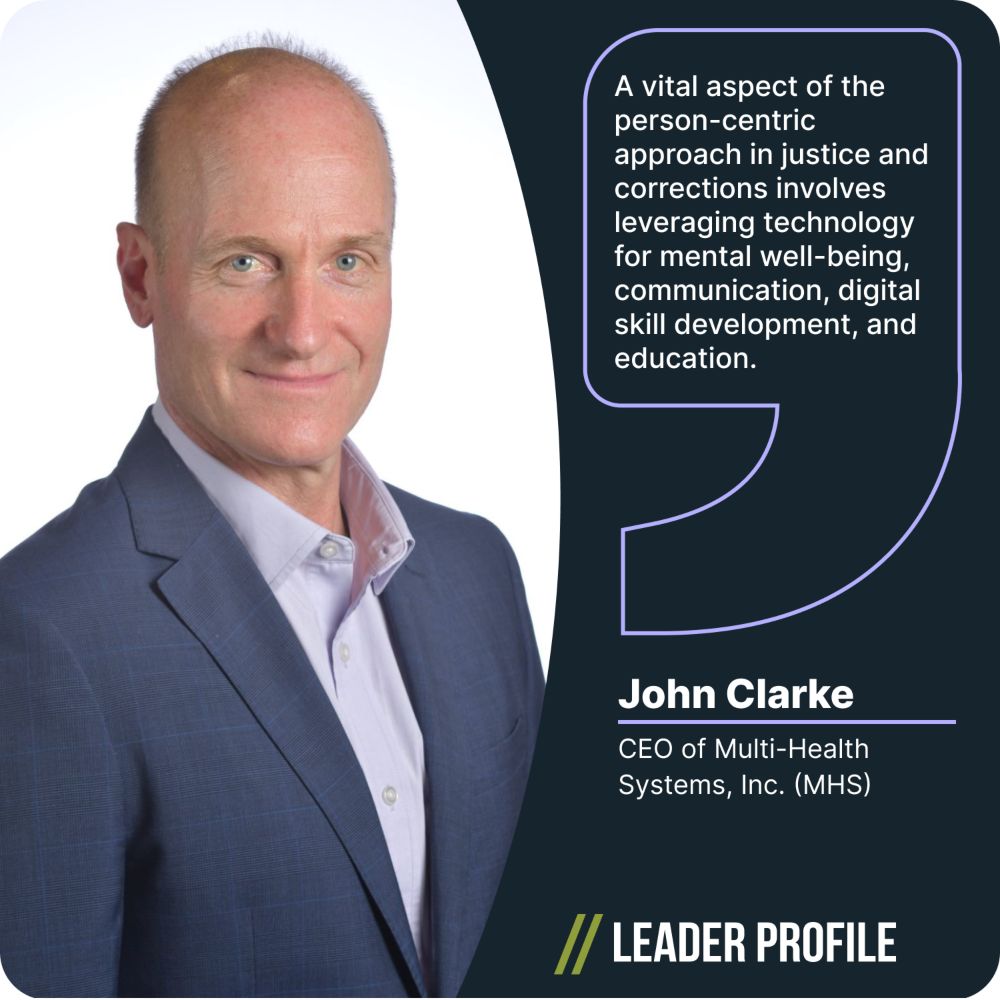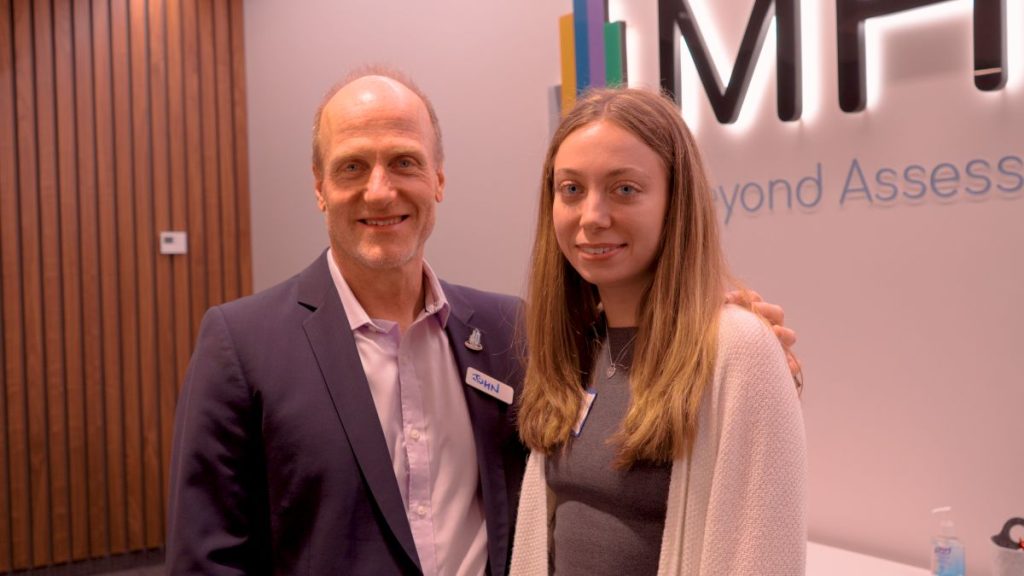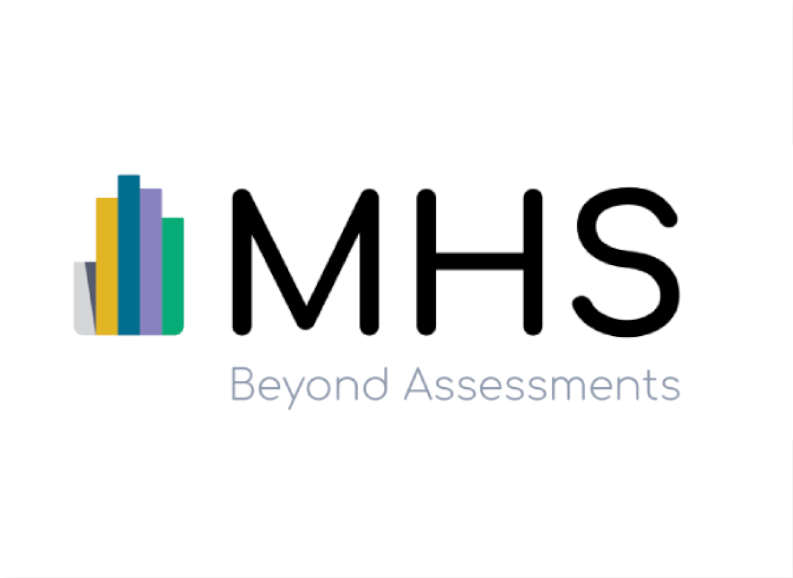
An inspiring look at the projects and contributions of leaders in the Justice sector
Welcome to the JUSTICE TRENDS // Leader Profile – Interview series, where we bring you the stories and insights of distinguished leaders in Criminal Justice worldwide.
Guest
John Clarke
CEO of Multi-Health Systems, Inc. (MHS)

This is a multimedia interview
Can you share your vision for MHS under your stewardship as CEO? How do you see the company contributing to improve results in public safety and corrections?
Enhancing Public Safety and Corrections
JC: Since our founding over 40 years ago, our purpose at MHS has been to improve outcomes for individuals and their communities. We achieve this by continuing to advance our science and technology capabilities, harnessing human insight, and essentially bringing potential to life. MHS wants to lead the way in transforming public safety and corrections, prioritizing the well-being and dignity of all individuals involved in the justice system. Through innovation, evidence-based practices, and community engagement, we aim to improve outcomes and promote a more just, humane, and effective approach to addressing recidivism and promoting public safety.
The risk-needs-responsivity model to support and guide successful rehabilitation and re-entry into the community is at the heart of our public safety mission. Founded, of course, on our relationship with Dr Jim Bonta and the authors of our levels of service tools designed to not only measure risk but also identify needs that can facilitate case planning, resulting in improved outcomes for individuals, reduce rates of recidivism, and the creation of safer communities.
Today, MHS recognizes that a vital aspect of the person-centric approach in justice and corrections involves leveraging technology for mental well-being, communication, digital skill development, and education. Large segments of justice-involved individuals struggle with basic literacy. Inviting technologies to revolutionize the traditional education model can create an immersive and user-friendly learning experience, further fostering the rehabilitation of justice-involved individuals and preparing them for release to a technologically advanced world.
Taking a person-centric approach to mental health support for prisoners involves utilizing technology as a transformative tool to assist in addressing their distinct psychological challenges. Leveraging digital platforms, justice-involved individuals can access remote mental health consultations, ensuring timely and confidential support from healthcare professionals. The same support can be offered to correctional officers and other personnel for a holistic person-centric approach.
Digital platforms can facilitate secure and accessible communication between staff and justice-involved individuals, encouraging meaningful connections. Justice-involved individuals can benefit from improved connectivity with their support networks, which foster emotional well-being and reduce feelings of isolation.
What is MHS’ strategy when navigating the challenges of bringing new solutions to an industry that has historically been cautious towards adopting change?
Overcoming industry challenges
JC: Positive change is absolutely happening. We see this as customers adopt new technologies to support rehabilitation and reintegration best practices. Legislators and other stakeholders have prioritized implementing policies that provide a more balanced approach to public safety. The evolving framework is rooted in reducing returns to prison for technical violations, expanding alternatives to prison for persons convicted of low-level offenses, and authorizing earned release for prisoners who complete specific rehabilitation programs. We are encouraged by this progress.
For our part, at MHS, we navigate the challenges of bringing new solutions to the industry through proactive and transparent engagement with stakeholders, including correctional staff and leadership, to foster buy-in and address concerns. Alignment and commitment are essential for successful implementation. Senior leadership must fully support change by allocating resources involving key personnel and granting decision-making authority to overcome challenges. Neglecting staff involvement can impede progress and hinder project outcomes.
By nurturing trust, encouraging collaboration, and empowering communities, we are confident in our ability to create a supportive environment that fosters positive outcomes for justice-involved individuals and the wider community.

Community involvement is a pivotal aspect of our approach at MHS. We acknowledge the crucial role of communities in the reintegration process and the value of fostering partnerships between justice agencies, service providers, and local organizations. By nurturing trust, encouraging collaboration, and empowering communities, we are confident in our ability to create a supportive environment that fosters positive outcomes for justice-involved individuals and the wider community.
As a testament to our approach at MHS, we draw inspiration from the success of our Pathway solution. Our journey began with the development of our probation technology solution, Pathway in the Community. We actively engaged our users, customers, and partners, and sought the counsel of industry thought leaders. While we had some understanding of the emerging issues in probation services, we were eager to deepen our expertise. We conducted interviews and ongoing discussions with justice-involved individuals to gain a deeper understanding of their challenges. Their insights were invaluable and significantly influenced the design and development of Pathway in the Community.
Finally, we bring solutions backed by our well-established MHS reputation as science-based, credible, and trusted by industry partners, customers, and stakeholders. Building on our commitment to ethical practices, compliance, and psychological assessments, MHS has developed a robust framework for ensuring the ethical use of technology in public safety applications. This includes addressing data privacy issues, algorithmic bias, and transparency to maintain trust and integrity in deploying technological solutions.
Reflecting on MHS’ own digital transformation, what are the most significant challenges, and how are you leveraging your experience to inform your approach and to capitalize on emerging opportunities?
Navigating digital transformation
MHS ultimately persevered through these challenges, laying the foundation for realizing emerging opportunities in a digital space. From this experience, we gained valuable insights into how to address similar challenges in technological advancement within public safety.
Similar to the resistance encountered when digitizing psychological assessments, there was reluctance within the public safety sector to embrace new tracking technologies, whether for bolstering safety measures or implementing technology for correctional workers and justice system stakeholders. Data privacy, ethical concerns, and integrating technology into established workflows pose hurdles. We overcome these challenges by actively involving stakeholders in the public safety sector, including law enforcement agencies, correctional facilities, and community organizations.
By fostering dialogue and partnerships, we can address concerns, gather feedback, and co-create solutions tailored to the specific needs of these organizations. Just as MHS evolved from paper-based assessments to digital platforms, we continue to innovate and adapt to emerging technologies in the public safety domain by staying at the forefront of technological advancements and offering progressive solutions that address evolving challenges in public safety and contribute to improved outcomes.
How can digital platforms like Pathway, and Pathway in the Community contribute to promoting rehabilitation and successful reintegration into society?
Pathways for rehabilitation
JC: The Core Pathway platform is an exciting addition to the MHS Public Safety portfolio. Providing this technology within prisons facilitates digital learning—from basic literacy to advanced vocational upskilling—and online training for correctional staff, for example, effective communication techniques, de-escalation strategies, and conflict resolution methods. It also improves connectivity for justice-involved individuals with their support networks and helps with a successful transition into an increasingly digital society.
However, we also recognize that too many people are admitted to prison due to technical probation and parole violations. Lawmakers in the U.S. are realizing this and considering policies that allow early completion of probation and parole sentences, including measures that reduce the time served requirement for successful participation in rehabilitation programs.
Pathway in the Community has been developed to support procedural justice by building trusting relationships between probation officers and their clients.
Pathway in the Community has been developed to support procedural justice by building trusting relationships between probation officers and their clients. It encourages self-reliance and improves case management. The solution provides the tools necessary to support probation officers and create positive outcomes for clients. Pathway is a through-the-gate platform that supports all users from prison to probation, including justice-involved individuals, supervised users, probation staff, caseworkers, friends and family, and even professional external contacts, such as lawyers and healthcare workers.
Pathway and Pathway in the Community are one platform but two comprehensive, independent, and complementary solutions. Pathway in the Community features interactive self-service tools for probation officers and probationers to contribute to the rehabilitation journey, improving user outcomes, increasing probation officers’ efficiency, building communication, trust, and accountability, and promoting responsible behavior.
The platform’s main feature prioritizes supervision and easier compliance. It helps users monitor and comply with the terms of probation and community-based court orders. It’s a self-service platform that provides tools for users on the move. It’s web-hosted, hardware agnostic, accessible on any device, and available 24/7.
It includes really powerful communication tools, including video and messaging, secured audit communications, court documents, etc. It also has basic organizational tools, calendars, reminders, and alerts, and it ultimately allows for self-management, self-check-ins, and self-reporting.
Pathway in the Community is very exciting, and we believe it will positively impact successful re-entry back into the community for justice-involved individuals.

Looking ahead, what other technologies or innovative solutions is MHS actively exploring to bolster its impact in the Justice sector?
Exploring new technologies
JC: Looking into the future, we envision AI’s potential to enhance corrections across various aspects. Employed ethically and focused on humanity, it promises to enhance the safety, security, and well-being of individuals within the prison system. AI could improve the quality of information-enhancing insights corrections professionals use in decision-making. AI could be used to support more efficient workflow in surveillance and risk mitigation. Importantly, it could save human resources, allowing focus on more meaningful work, freeing up time for face-to-face interaction, and focusing on rehabilitative programming.
However, while it holds great promise, AI-based technology should be predictable, responsible, verifiable, and respect fundamental rights. We should understand and address ethical and privacy concerns, ensure transparency, accountability, and decision-making, and prioritize human oversight and intervention where necessary.









